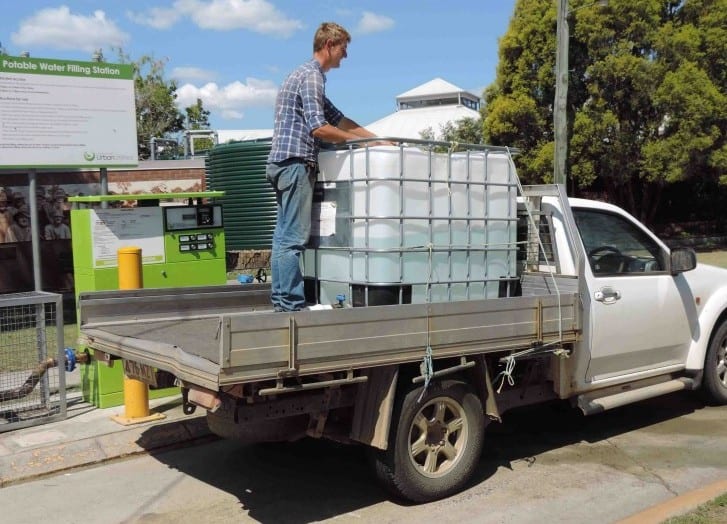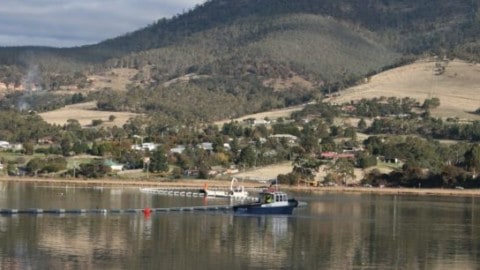Marie-Claire Colyer from Abberfield Industries has written a short story about the benefits of water filling stations in Australia’s dry landscape.
There is an old man at the water filling station. Years and sun have engraved their own lithograph over his face. It tells of hardship and hope. The blue of his eyes are faded but still flare with determination.
There hasn’t been rain for months; gully’s are dry, their caked banks lined with mocking traces of downpours, the broken lips pock-marked with the hoofs of cattle. He sold all his stock, all bar the breeding cows and the lone black bull.
He would have lost even them. But now there is the water filling station.
He has to drive miles to reach it, standing lime-green by the open road. It is a rectangle of fully-functioning salvation; a life-line with wide connecting pipes for tankers, narrow pipes for farmers like him.
Each day he makes this trip to fill up the plastic cube that nestles on the tray of his ute. Each day he scatters hay for his breeding stock and provides this precious water; drinking water. Not stagnant and rife with bacteria and slime, but clear, clean, life-giving water.
He stands by the aged paint of his ute, an arm draped on the sundrenched metal and watches the water flow into his cube. Times are still hard but with potable water he can nurse his stock through the lean spells.
Henrietta hen, the unsolicited family pet, perches on the foot rail of Kathy’s bed. She was hatched from an egg filched from the warm pile her mum collected for the morning’s omelettes and incubated under the tabby cat and dolly’s knitted scarf.
Kathy insists on feeding her as she would pretend to feed her doll which is now relegated to the crack between the bed and the wall. Henrietta sips drinking water from a dessert spoon, pampered. But life is different outside for the other residents of the poultry yard.
Kathy’s mother sneaks to the town park each night to fill drums from the tap. She needs fresh water for the hens. She’s been caught twice but what else can she do? There is no water dispensing station for her to buy potable water.
Driving past the stall by the property that normally hangs festooned with hand-painted signs is a forlorn experience. Every other year, along with the eggs, there have been cases of vegetables and fruit for sale, the aroma of oranges wafting in through car windows.
The townies whose gardens are too small to grow their own come to Kathy’s mum for fresh produce; local, organic, served with smiles and the occasional cup of tea.
This year the signs are absent or turned around so the paint-dripped backs declare the bareness of empty shelves.
Only the speckled and white array of eggs keeps Kathy’s mum on her stool. There will be no vegetables until the rains, belts will be tighter till then and Kathy will have to wait for a henhouse for Henrietta.
It has been raining, a drifting mist that has settled on vine leaves and the hard green globes of immature grapes for days; a wet, warm invitation for powdery and downy mildew.
Unchecked the crop will decay and the grapes will turn fuzzy and black with mould, dropping from the vines before they ripen. Without the grapes there will be no wine, which means no income. A year’s work destroyed by a week’s rain.
Now the clouds are lifting, being shoved aside by an errant wind. The pump pack squirts chemicals over the vines, the breeze blowing it over the vineyard and up past the tin roof of the house, where it settles in the corrugations and slides with water droplets into the tank; the tank that holds drinking water. But not anymore as from now on potable water will have to be carted in. But from where?
The smell of dust eddies in the wake of the cows as they search for something to drink. The farmer does the rounds of the fence line, checking for breaks. There have been several.
Maddened by thirst the cattle push their way through. Too many times he’s had to put-down a cow garrotted by wire. This time though he is on his knees by the remnants of the pool evaporating in the trough below the standpipe.
Only a trickle makes its way from the metal rim into the basin below. The heartrending sound of a cow in pain contorts the air. He reaches out, runs a finger over the algae smeared stone. There will be no surviving this one. His livelihood is in ruins.
There is a lowing over the brow of the hill, cattle milling on the verge of the road. Here the grass is that much greener. Here where the runoff traps the morning dew. Hereford rub shoulders with one another, working their way like a slow rust-red river alongside the ribbon of tarmac.
The drover leans back in his saddle, sitting easily, letting the horse with the white blaze follow the cows. He has done this for weeks. The sound of a lazy blowfly bats the mare’s ears and they flick, catching sunlight on fine hairs.
Across the vacant fields a crow yarks out its call following it with a dying gurgle that leaves stillness in its wake.
They will meander by the roadside till dusk finds them by some property where he can ask to halt his herd. A ute will rev its way past straggly gums that droop like used dishcloths to join the drover swinging his saddle to the ground.
A non-descript ute sloshes as it comes to a stop. The cows know what’s in the cage enclosing the plastic cube. A weaned calf head-buts the driver as he lowers the tailgate. The cattle are watered.
In the morning the drovers will part ways and the process will repeat. One will shadow the herd, the other visit the blue box of the water dispensing station.
The thieves come at night to the machine; easy pickings, a tall, slim box, full of cash ripe for the taking. Except, the machine is bolted to the ground, its locks tested in the night shadows of Belfast, Sheffield and Dublin, holding little money.
Most users pay by credit card on a secure line. The boys leave in frustration to search elsewhere.
The sun rises, bringing heat. Grass crunches underfoot. The spare water tank rings hollowly as Luke pats it in passing. He’s siphoned off the remaining drinking water into the house tank for the family to use.
But that is now critically low. He’s forgotten what a shower feels like, just the rough slide of a flannel over his skin. His kids are so grubby they look like they’ve been abandoned. They cannot afford to wash their hair more once a week and even then they slop only a little in the sink.
Luke goes to check the well. Each year the level of the water table has dropped till now there is merely colloidal clay, a slime-filled tube of mud. This year there will be no water to pump over the crops. He will need another way.
He will need a source of drinking water, potable water; a source where he can collect as much as required, to fill a tanker or a drum stowed in the back of the car.
Such as water dispensing stations, built for people like Kathy’s mum, the cattlemen, farmers that work the land; built for tanker drivers carting water to distant farms, for townsfolk who need a few litres to water prized roses.
The need is there and potable water dispensing stations designed and manufactured by Abberfield Industries in Australia, are made by Australians for Australians and aim to fill that need.
Farmers can talk to your local council regarding instalment of a water dispensing station in their town.
Luke looks over the wilting fields, a headache born of worry blooming in his skull. Where is he to obtain water?
Kathy’s mum listens to the town police as the evidence spills over the top of her drums. At a vineyard in the Upper Hunter Valley uncontaminated water is carted from Sydney just so the family can drink a glassful.
But elsewhere the drovers and an old man with a weather-beaten face know where to obtain water; clear, clean, life-giving. Now they can survive.
When does water become a right?
This partner content is brought to you by Abberfield Industries. For more information on Abberfield Industries’ water dispensing stations, visit www.abberfield.com.au.















